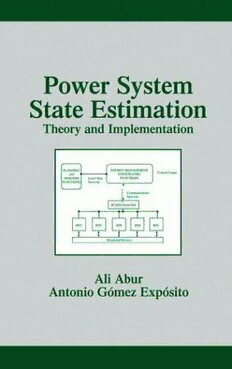Download Power System State Estimation: Theory and Implementation (Power Engineering (Willis)) PDF Free - Full Version
Download Power System State Estimation: Theory and Implementation (Power Engineering (Willis)) by Ali Abur, Antonio Gómez Expósito in PDF format completely FREE. No registration required, no payment needed. Get instant access to this valuable resource on PDFdrive.to!
About Power System State Estimation: Theory and Implementation (Power Engineering (Willis))
Offering an up-to-date account of the strategies utilized in state estimation of electric power systems, this text provides a broad overview of power system operation and the role of state estimation in overall energy management. It uses an abundance of examples, models, tables, and guidelines to clearly examine new aspects of state estimation, the testing of network observability, and methods to assure computational efficiency.Includes numerous tutorial examples that fully analyze problems posed by the inclusion of current measurements in existing state estimators and illustrate practical solutions to these challenges.Written by two expert researchers in the field, Power System State Estimation extensively details topics never before covered in depth in any other text, including novel robust state estimation methods, estimation of parameter and topology errors, and the use of ampere measurements for state estimation. It introduces various methods and computational issues involved in the formulation and implementation of the weighted least squares (WLS) approach, presents statistical tests for the detection and identification of bad data in system measurements, and reveals alternative topological and numerical formulations for the network observability problem.
Detailed Information
| Author: | Ali Abur, Antonio Gómez Expósito |
|---|---|
| Publication Year: | 2004 |
| ISBN: | 9780824755706 |
| Pages: | 337 |
| Language: | English |
| File Size: | 4.276 |
| Format: | |
| Price: | FREE |
Safe & Secure Download - No registration required
Why Choose PDFdrive for Your Free Power System State Estimation: Theory and Implementation (Power Engineering (Willis)) Download?
- 100% Free: No hidden fees or subscriptions required for one book every day.
- No Registration: Immediate access is available without creating accounts for one book every day.
- Safe and Secure: Clean downloads without malware or viruses
- Multiple Formats: PDF, MOBI, Mpub,... optimized for all devices
- Educational Resource: Supporting knowledge sharing and learning
Frequently Asked Questions
Is it really free to download Power System State Estimation: Theory and Implementation (Power Engineering (Willis)) PDF?
Yes, on https://PDFdrive.to you can download Power System State Estimation: Theory and Implementation (Power Engineering (Willis)) by Ali Abur, Antonio Gómez Expósito completely free. We don't require any payment, subscription, or registration to access this PDF file. For 3 books every day.
How can I read Power System State Estimation: Theory and Implementation (Power Engineering (Willis)) on my mobile device?
After downloading Power System State Estimation: Theory and Implementation (Power Engineering (Willis)) PDF, you can open it with any PDF reader app on your phone or tablet. We recommend using Adobe Acrobat Reader, Apple Books, or Google Play Books for the best reading experience.
Is this the full version of Power System State Estimation: Theory and Implementation (Power Engineering (Willis))?
Yes, this is the complete PDF version of Power System State Estimation: Theory and Implementation (Power Engineering (Willis)) by Ali Abur, Antonio Gómez Expósito. You will be able to read the entire content as in the printed version without missing any pages.
Is it legal to download Power System State Estimation: Theory and Implementation (Power Engineering (Willis)) PDF for free?
https://PDFdrive.to provides links to free educational resources available online. We do not store any files on our servers. Please be aware of copyright laws in your country before downloading.
The materials shared are intended for research, educational, and personal use in accordance with fair use principles.

